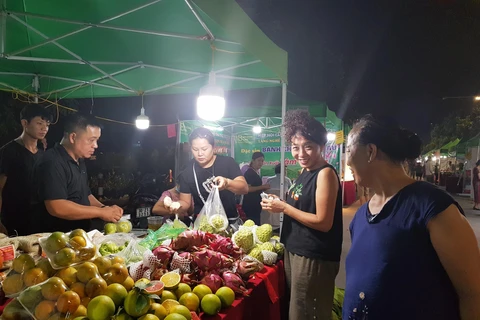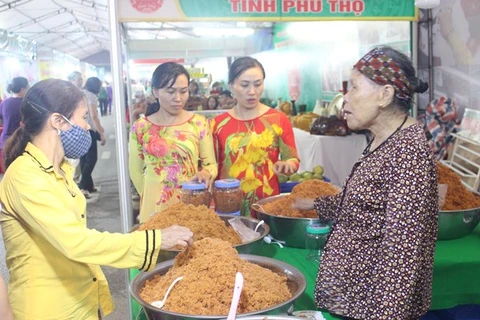 Making dried bananas in Vi Huong commune, an OCOP product of Bach Thong district, Bac Kan province. (Photo: VNA)
Making dried bananas in Vi Huong commune, an OCOP product of Bach Thong district, Bac Kan province. (Photo: VNA) Hanoi (VNA) – Vietnam hopes to have 3,843 products qualified for standards of One Commune-One Product (OCOP) programmes by this year, said deputy minister of agriculture and rural development Tran Thanh Nam at a conference in Hanoi on January 9.
Among those products, more than 2,200 are food and 397 are drinks. The others are herbal products, textile fabrics, souvenirs, furniture and tourism or service products.
Localities across the country currently have about 2,400 products qualified for OCOP standards.
The programme targets standardising at least 1,200 more products by this year and having about 500 new small and medium-sized businesses and cooperatives making OCOP products.
The OCOP programme was launched in May, 2018 to develop one strong product for each commune. After one year and a half, it has contributed to rural area construction, according to the Ministry of Agriculture and Rural Development.
“The programme has become a widespread campaign in many countries in Asia, Africa and Europe with various names. Although Vietnam kicked off the programme quite late, it has come up with initiatives to connect global network. The values of OCOP, handicraft products and art souvenirs have been recognised,” Nam said.
According to the ministry, after the issuance of OCOP certificates, products have been given stamps to trace their origin.
Retailers and e-commerce suppliers have signed consumption contracts to buy OCOP products. Profits from these products have also been on the increase.
Ngo Tat Thang, deputy chief of staff of National Steering Committee on New-Style Rural Areas, said OCOP products have their quality improved and packaging diversified as well as meet standards on stamps and labels.
Nguyen Minh Tien, chief of staff of the committee, said trade promotion at the national level needs to be prioritised. The Ministry of Agriculture and Rural Development plans to work with ministries and agencies to organise national OCOP trade fairs and festivals and three regional OCOP fairs.
The localities should step up provincial trade promotion and expand a network of OCOP product stores and centres as well as foster OCOP e-commerce, he said.
He urged localities to improve market forecast quality, especially long-term and annual forecasts to help enterprises with their business plans.
Authorities should encourage and offer support to people to preserve and develop traditional products. The Ministry of Agriculture and Rural Development recently launched a portal which shares market information to help farmers access markets easier, Tien said./.
VNA






















